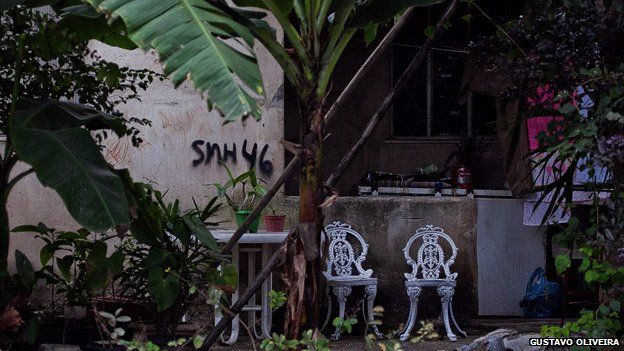Brazil Rio: Rare victory for residents in regeneration battle
- Published

Nearly all of the chaotically built homes in the small community of Vila Uniao in the west of Rio have "SMH" painted onto their walls.
Like a sort of officially sanctioned graffiti, the initials of the housing department of Rio de Janeiro were sprayed on homes marked for demolition.
Almost 900 families, many of which lived on Rua da Esperanca (Hope Street), were facing eviction because their houses stood in the way of the planned route for the Transolimpica bus rapid transit system (BRT).
The extension of the BRT is part of the upgrades planned ahead of the 2016 Olympic Games, which the city is hosting.
The new 25km (15 mile) rapid bus route is expected to carry 70,000 passengers a day.
It will link Barra da Tijuca, which will host the athletes' village, to Deodoro, the venue for several Olympic events.
Rio City Hall intended to relocate the families from Vila Uniao to small social housing apartments or offer compensation packages.
But many residents did not want to leave their 30-year-old community.
After two years of uncertainty and a small yet vocal campaign of resistance, they have managed to save it from demolition.
Instead of running straight over the neighbourhood, the new $555m-bus system (£370m) will now cut around Vila Uniao.
This means only 191 families will need to be relocated, a 78% reduction in the original number of expected evictions.
"We're celebrating a lot because it was 900 families and now it's 191," said Robson da Silva Soares, one of those leading the resistance to the demolition of Vila Uniao.
Bittersweet victory
But the victory was bittersweet for the residents, who, in 2012, had been promised investment as part of an initiative to improve the city's poor neighbourhoods by 2020.
Months later, the Transolimpica project was announced and along with it, the need to relocate hundreds of families.
Many of the homes earmarked for demolition were bigger than the government-funded apartments residents were being offered, explained 68-year-old Francisco Gabriel.
"I've been here 20 years and if it's a choice between leaving for the [government-funded] Colonia Juliano Moreira apartments or staying here, I'd prefer to stay here," he said.
"The homes there are smaller."
According to Rio City Hall, plans for the Transolimpica were redrawn to reduce the impact on Vila Uniao.
"We managed to get public land belonging to the federal government to alter the project and attend to the needs of the residents," a spokesman said.
Rio City Hall said the project, while causing disruption to some, also had huge potential to improve the lives of locals by linking their neighbourhood to other public transport lines.
"The future corridor will benefit the population leaving a huge legacy of mobility: a fully integrated transport network with the Transoeste and Transcarioca BRTs already opened, and the rail network in Deodoro," officials said.
Divisions within
But while the reduced number of evictions was welcomed by the majority in Vila Uniao, it did not satisfy everyone, leaving the community divided.
Cintia Neves, who runs a lunchtime cafe in the neighbourhood, has lived here almost her whole life.
The 26-year-old shares the house her late father built when she was six months old with her mother and brother.
"The vast majority [in the community] think the change is good but there are some who wanted to leave," she says, explaining that some homes in Vila Uniao were barely more than hovels.
"We are staying for now" she said about her family.
But even though the relief of those residents whose homes have been saved is palpable the new route is still likely to affect the community.
There is the local football pitch, for example. The original plan spared it but the new project runs over it instead.
Rio City Hall said it was in talks with the owner of a local football ground to provide a new pitch.
'No community'
There were also concerns that those moving to the new social housing would lose the community feel they enjoyed in Vila Uniao.
"I grew up in the community with my parents and four brothers," Mr Soares said.
"There's a market, a bank, a school. But the place where the families are moving to doesn't have any of this. They have to start everything again."
Mr Soares said he and his fellow campaigners would not give up: "My house was in the path of the BRT and now I don't have to leave.
"But even so, I will continue with the same fight because independent of me, we're fighting for residents to have their rights."
And he is confident he can drive down the number of those facing eviction even further. "We see the possibility of removing fewer still than 191," the 37-year-old electromechanical technician said.
- Published16 January 2015
- Published9 January 2015
- Published8 January 2015
- Published2 June 2023